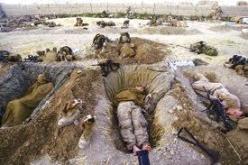An Iranian official said there is information suggesting Mojahedin-e Khalq Organization (MKO) terrorists killed and buried in Camp Ashraf some of the Iranian prisoners of war who had been handed over to them by the  regime of Saddam Hussain, and hence the need to search the area.
regime of Saddam Hussain, and hence the need to search the area.
General Seyed Mohammad Baqerzadeh, the commander of search committee for the lost people at the Armed Forces Headquarters, announced the news in an interview with Tasnim News Agency on Sunday, adding that three days ago his organization had a meeting with officials of the International Red Cross Society and representatives of the Iraqi defense and human rights ministries in the southwestern Iranian city of Ahvaz on the matter as well as a number of other issues.
“We reached some agreements in that meeting and it was decided that we visit some cemetries in the Iraqi Kurdistan, as some of those (Iranian prisoners of war) martyred in the camps might have been buried there. We have received some of the bodies in the past, but some of them have not been found yet – which needs search and follow-up,” he said.
General Baqerzadeh added that there is information showing that some Iranian POWs were handed over to MKO terrorists, who were based in camp Ashraf, by the Iraqi regime of Saddam Hussain and that some of them “were martyred and buried there,” which is why the search committee wants permission to search the cemetery of Camp Ashraf for bodies.
The official end of MKO terrorist group’s activities in Camp Ashraf came on September 11, less than two weeks after clashes in the camp left at least 50 of its members dead.
The remaining members of MKO terrorists were transferred from Camp Ashraf (now the Camp of New Iraq) to Camp Liberty, near Baghdad airport.
The MKO — listed as a terrorist organization by much of the international community — fled Iran in 1986 for Iraq, fought on the side of Saddam Hussein during the Iraqi imposed war on Iran (1980-88), and was given a camp by Saddam.
The group has been behind numerous acts of terror against Iranian civilians and officials, and was involved in the 1991 bloody repression of Shiite Muslims in southern Iraq, and the massacre of Iraqi Kurds in the country’s north.

